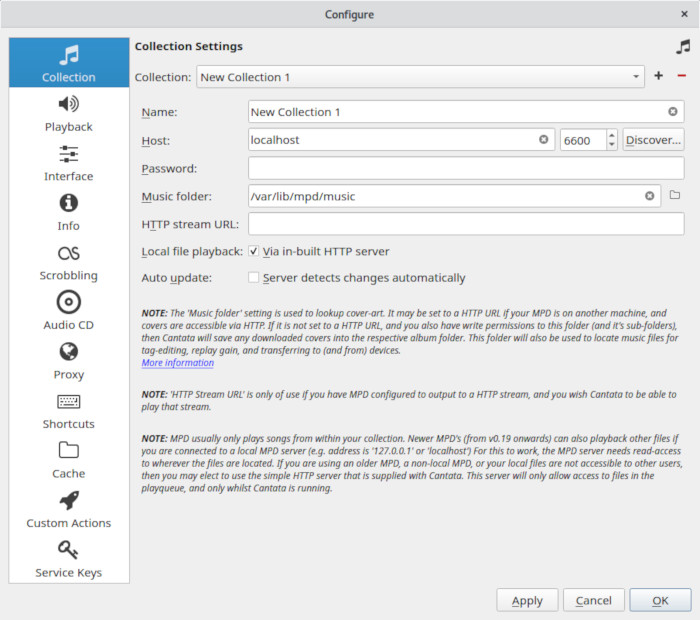Last Updated on September 1, 2020
Configuration Options

One of the strengths of Cantata is its customization options which are very extensive.
- Collection – Define your collections. These can be local or remote collections.
- Playback – You can set fadeout time, enable crossfade, apply replay gain, and apply a volume step.
- Interface – Here’s an amazing range of settings covering the sidebar, play queue, toolbar, external, tweaks, covers, and general settings.
- Info – Here you can select websites to search for lyrics, and more.
- Scrobbling – Here you can enter your Last.fm account settings, choose whether to scrobble tracks, and to show the ‘Love’ button.
- Audio CD – Set album and track information retrieval. You can turn off the full paranoid mode audio extraction.
- Proxy – You can choose from the system proxy system, or define a manual proxy configuration.
- Shortcuts – Cantata can be controlled by the keyboard. Here you can define keyboard shortcut settings.
- Cache – The software caches covers, scaled covers, backdrops, lyrics, artist/album/track information, and more. This pane shows the amount of spaced used with the option to delete cached items.
- Custom Actions – Define external commands that are called. These commands appear in a Customs Actions entry.
- Service Keys – The software uses internet services to provide covers, radio stream listings and more. Most require an API key, but some services have limits on usage per key. This section lets you register with a service yourself. Set your API key for LastFM, FanArt, Dirble, ShoutCast, and SoundCloud.
Pages in this article:
Page 1 – Introduction / Installation
Page 2 – In Operation
Page 3 – Song Information
Page 4 – Internet Streaming
Page 5 – Other Features
Page 6 – Configuration Options
Page 7 – Summary

It fails at the first page. What the hell do I put for ‘host’ when I want my own music on my own machine? Never been asked before on any music program.
If the MPD server is running on the same system as Cantata, enter localhost in the Host input field.
The MPD server can run in two “connection” type modes – either a socket (eg /run/mpd/mpd.socket) [restricts connections to access permissions on socket and directory] or via a TCP/IP port associated with the IP of localhost (127.0.0.1) [restricts connections to only local users) or with the IP of the network interface (to allow remote connections).
If using the socket approach and systemd, MPD will stay off until activated by a connection on the socket — this is useful if you need mpd to be available but not always running. In this case you enter the patht to the socket in the Cantata input field rather than a host name and you do not need a password. It is not immediately obvious that a path name rather than a host name can be a valid entry.
Which method for connection is determined by the value of the “bind_to_address” parameter in the MPD configuration file, either the path to the socket or the IP address (or associated host name) of the interface to use.
And now the really bad, devastating, grim news for all afficianados of Cantata.
Cantata is DEAD and will become subject to bitrot unless somebody else is prepeared to steo up tot he plate.
From the Canata page on Github
commit af04723c0ca7854df53562ed8226fd324d6a23cd
March 2nd, 2022
QUOTE
After 10 years, development of Cantata has now ceased, and this repository is read-only. v2.5.0 is the last released version.
UNQUOTE
It’s been on the cards for years. The sole developer of Cantata openly stated he hasn’t used this software for 4 years, and it’s been in maintenance mode for ages.
That’s the nature of open source software. A lot of software fades away particularly when there is only one person coding the project.
The good open source software can sometimes be forked and development continues. If not, the software will probably carry on working for some time.
At least there’s a chance the project will continue in development. After all, Cantata itself was a fork of an existing project.
It’s alive! It lives!
This page needs updating because Cantata has been forked from the CDrummond source (put in archival mode back in 2022) and ported to Qt6 by developer nullobsi and is now up to version 3.3.0 (releases on November 14, 2024).
Yes I know about the fork (and the page already had a link to the fork GitHub repository.
I am in the process of writing a fresh review.
Even abandoned open source software is never really dead.
Yes, that’s why we don’t necessarily remove abandoned software from our curated roundups. If the program compiles on modern distros and doesn’t pose any known security issues, it’s likely we’ll retain the program in a roundup.